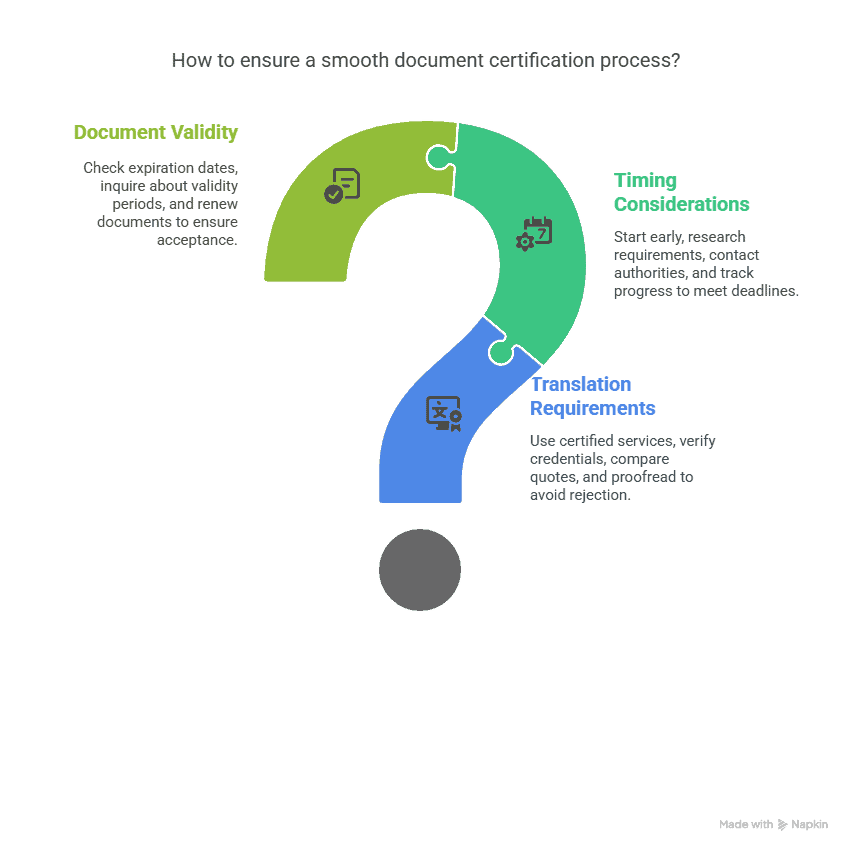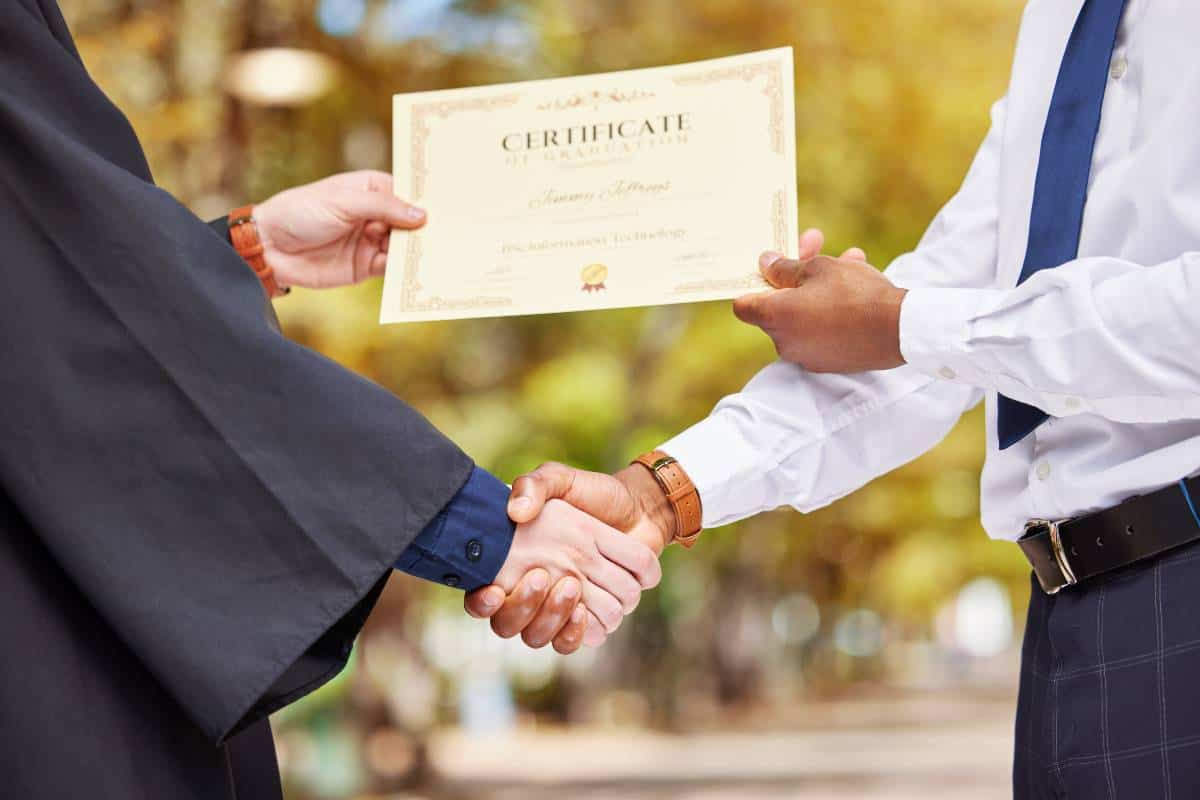Degree Certification Thailand: Attestation and Authentication
Moving to Thailand and wondering how to get your foreign degree recognized? You’re not alone. Getting your foreign degree certification Thailand can feel like navigating a maze of government offices and paperwork, but it doesn’t have to be overwhelming. Whether you’re planning to teach English, start a business, or simply want your qualifications officially recognized, understanding the degree certification process is crucial for your success in the Land of Smiles.
Key Takeaways
- Foreign degrees must undergo authentication through your home country’s embassy and Thailand’s Ministry of Foreign Affairs before being recognized.
- The certification process involves multiple steps: notarization, state authentication, federal authentication, and final embassy legalization.
- Teaching positions and work permits in Thailand require properly certified educational credentials to meet the Ministry of Education standards.
Understanding Thailand’s Document Recognition System
Thailand operates under a unique system for recognizing foreign educational credentials. Unlike many Western countries that participate in the Hague Convention, Thailand has not joined the Hague Convention on the Simplified Authentication of Documents. This means your documents cannot receive a simple apostille stamp and require a more comprehensive authentication process.
The Thai government takes educational credential verification seriously, especially given the country’s focus on improving education standards and preventing fraudulent qualifications. This thorough approach protects both employers and the integrity of Thailand’s educational system.
The Complete Certification Process

Step 1: Document Preparation in Your Home Country
Before your degree can be recognized in Thailand, it must first be properly authenticated in your home country by a notary. Official documents requiring authentication will need to be certified first by the entity that issued them, then by the state in which that entity is located, and then by the federal government (the U.S. State Department).
For American graduates, this means starting with your university’s registrar’s office, then moving to your state’s Secretary of State’s office, and finally to the U.S. Department of State. Each step adds an official seal or stamp that verifies the authenticity of the previous certification.
Step 2: Embassy Authentication
Once your documents are authenticated by your home country’s government, the next step involves the Thai Embassy or Consulate in your country. Once the document has been authenticated by the U.S. State Department, the foreign embassy in the United States of the country requesting the document will perform a final authentication.
Different Thai consulates may have slightly different requirements, so it’s essential to check with the specific consulate handling your region. Fees typically range from $15 to $20 per document, and processing times vary from same-day service to several business days.
Step 3: Ministry of Foreign Affairs Legalization in Thailand
The final step occurs once you arrive in Thailand. Once the documents needed are in Thailand, submit the documents to the Thailand Ministry of Foreign Affairs-Legalization Division to make the documents legal for use in Thailand. This final stamp makes your degree officially recognized for use throughout Thailand.
The Ministry of Foreign Affairs Legalization Division can be contacted at (+66) 2-572-8442 for specific questions about their current requirements and processing times.
Special Considerations for Teaching Positions
If you’re planning to teach in Thailand, degree certification becomes even more critical. Formal schools—like public government schools or private ones—stick to the Thai Ministry’s curriculum and require a teacher’s license. To obtain this teaching license, your educational credentials must be properly certified.
The Teachers Council of Thailand (TCT) has specific requirements for foreign educators. You must be at least 20 years of age. You need to have at least one of the following academic qualifications: A Bachelor’s degree in education from a recognized university or institute. A Bachelor’s degree in a different field, plus a teaching license from another country.
For those without education degrees, Thailand offers temporary teaching licenses that allow you to work while gaining experience and potentially pursuing additional qualifications.
Working with Professional Services
Many expats choose to work with professional document legalization services to navigate this complex process. These services understand the specific requirements of each step and can help prevent costly delays or rejections.
Monument Visa offers fast, secure, and affordable legalization services for documents such as university degrees, birth certificates, marriage certificates, and more. We manage the entire process from notarization to consulate legalization. Professional services typically charge around $200 per document but include all necessary steps and provide regular updates throughout the process.
Common Challenges and Solutions

Translation Requirements
All documents not in English or Thai may require a certified translation. It’s important to use qualified translators familiar with educational terminology and Thai legal requirements.
Timing Considerations
The entire certification process can take several weeks to complete, especially if you’re starting from scratch in your home country. Plan accordingly if you have specific start dates for employment or business activities.
Document Validity
Some certifications have expiration dates or specific validity periods. Check with the relevant Thai authorities about any time limitations on your certified documents.
Digital Documents and Modern Approaches
While Thailand’s system traditionally requires physical documents, some changes are emerging. However, most official processes still require original hard copies with physical stamps and seals. Digital copies are generally not acceptable for official government submissions.
Cost Breakdown
The total cost for a degree certification in Thailand typically includes:
- Home country authentication fees: $20-50 per document
- State-level certification: $15-25 per document
- Embassy legalization: $15-20 per document
- Thailand Ministry of Foreign Affairs: Varies
- Professional service fees (if used): $150-250 per document
- Translation costs (if needed): $50-150 per document
Regional Variations
Different regions within Thailand may have slightly different processing times or specific requirements. Bangkok typically offers the fastest processing, while remote areas might require additional time for document verification.
Maintaining Your Certified Documents
Once your degree is properly certified, keep multiple certified copies in safe locations. Some Thai institutions may retain original documents, so having backup certified copies prevents future complications.
Consider storing digital scans of all certified documents in secure cloud storage for easy access when needed for various applications throughout your time in Thailand.
Future Changes and Updates
Thailand’s document recognition processes occasionally change as the country modernizes its administrative systems. Stay informed about updates through official government channels or professional networks of expats in similar situations.
The Thai government continues to balance maintaining security against fraudulent documents while making the process more efficient for legitimate applicants.
FAQs
How long does the complete degree certification process take?
Can I start working in Thailand before my degree is fully completed?
Do I need to certify my transcripts separately from my diploma?
What happens if my documents are rejected during the process?
Are there any degrees that Thailand doesn’t recognize?
Conclusion
Getting your foreign degree certified in Thailand requires patience and attention to detail, but it’s achievable with proper planning. The process protects both you and Thai institutions by ensuring credential authenticity. While it might seem bureaucratic, think of it as your official welcome to Thailand’s professional community. Start early, consider professional services like ours if the process feels overwhelming, and soon you’ll have your credentials properly recognized in your new home. Your future self will thank you for taking this important step toward building your life in Thailand.






